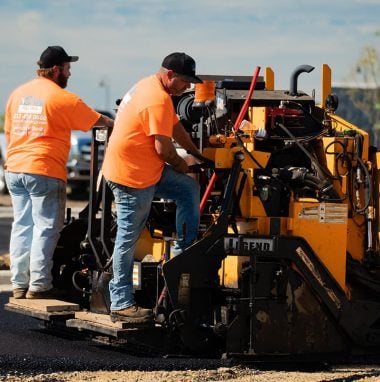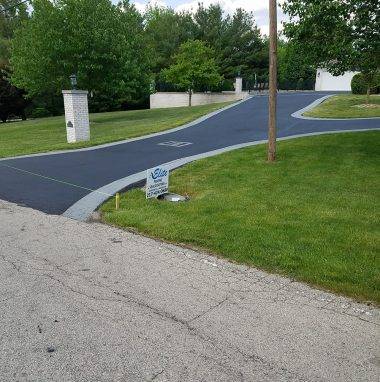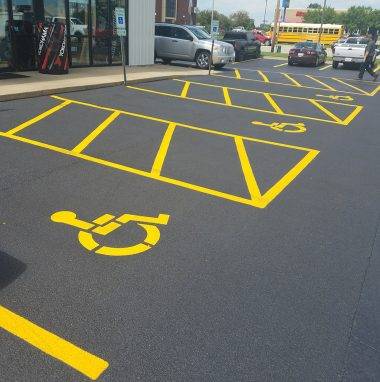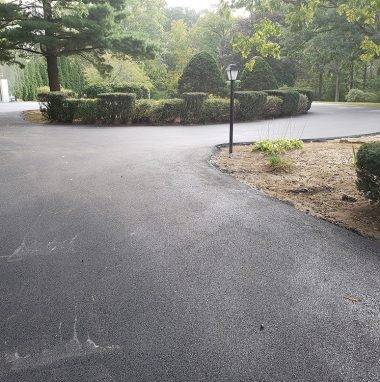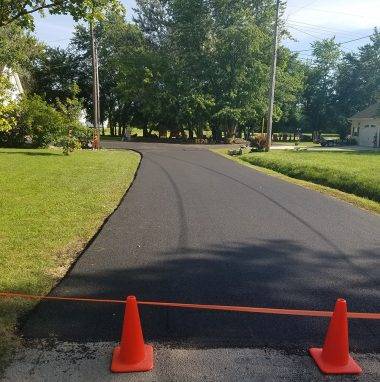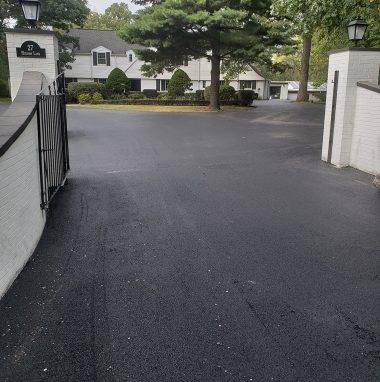Driveway Sealcoating Champaign, IL
Protect Your Pavement from Spring’s Wild Temperature Changes
Spring is upon us, and temperature changes are becoming just as common as rain. Unfortunately, these changes can cause problems with your pavement that can be both unpredictable and persistent. Thankfully, driveway sealcoating can help you here, mainly if you get this process done to your pavement soon after it is installed, replaced, or repaired.
As a result, you should seriously understand just how problematic spring’s temperature changes can be for your driveway, parking lot, or sidewalks. In this way, you can better understand how a great sealcoat can protect your investment and keep you from having to pay for unnecessary repairs to your pavement or to replace it far too soon for your financial good.
Spring Pavement Damage
Spring is one of the toughest seasons for your pavement for a variety of reasons. First of all, spring typically goes through a variety of temperature changes that can be quite challenging to tolerate. For example, Champaign, IL and Central Illinois often start the month with 30-40 degree temperatures that suddenly leap into 50-60 or even 70-degree ranges. Rapid switches from one day to the next are all too common during this season.
Unfortunately, these changes aren’t just annoying to you and other people in the area but can also damage your pavement. Although high-quality asphalt is typically designed to withstand a variety of weathering and temperature damage, excessive changes in temperature can be too hard for some pavement to handle. For example, you may notice a sudden increase in surface damage and various types of cracks across the surface of your pavement during the spring months.
When summer rolls around, and the heat level rises even higher, you can anticipate a multitude of issues. For example, excessive heat and high UV ray exposure can wear down the surface of your pavement and expose it to other types of weathering damage. Just as problematically, cracks and different types of damage can quickly spread and become more persistent in your asphalt slab. Fully understanding all of these changes is critical if deciding on your driveway sealcoating.
Temperature Changes
As your pavement suffers from the extreme temperature changes of spring, the surface and even deeper layers may suffer from a multitude of damage problems. These issues typically occur on a multitude of pavement types and can be very problematic. Understanding each can help you prepare for them and learn how to prevent them:
- New Crack Appearance – Excessive temperature changes can trigger a multitude of new cracks on the surface of your pavement. And while minor, they can become a serious issue if left unfixed.
- Increased Crack Size – Already existing cracks typically get worse during spring due to the excessive temperature changes. This problem worsens if you have a very wet spring.
- Water-related Damage – When water absorbs into your pavement or the subgrade, temperature changes will be even more damaging because of the expansion and contraction of this water.
- Potholes – The appearance of potholes is an ominous omen in the pavement. Simply put, these damaging holes indicate more severe and widespread issues with your pavement that need to be fixed immediately.
All of these issues make prevention a vital tactic for keeping your driveway in excellent condition. Don’t be afraid to take steps to either protect your pavement or repair spring-related problems as they develop. Thankfully, many types of repair methods can protect your driveway, including a good driveway sealcoating on the surface.
Driveway Protection
If you’re sick of strange temperature changes negatively affecting your pavement surface, you need to take a multitude of steps to protect your driveway or parking lot. For example, you can do spot repairs on cracks during the early days of the season to ensure that these minor imperfections don’t become more serious. This process is often a frustrating one because it can be hard to stop even minor cracks from becoming a more serious and pressing issue as the temperature changes.
The best way to protect your driveway, though, is to add a robust and reliable sealcoat to its surface as soon as you can to protect it from damage. A sealcoat will not only protect your driveway from heat- and temperature-related damage but will keep various types of weathering damage away. For example, excessive rain, sleet, and even snow during spring can damage your pavement, but a good sealcoat can keep them from absorbing into the surface and prevents a wide range of severe damage issues.
If you do plan on a driveway sealcoating, you need to make sure that the temperature and weather conditions are appropriate. For example, you’ll need a day when it is at least 50 degrees Fahrenheit outside for eight straight hours or more. Typically, you should find a day that is going to start above 50 degrees and only warm up as the day progresses. Then, you need to make sure that it isn’t going to rain for at least 24 hours. Rain on your sealcoat could cause complications that make it less effective.
Just as importantly, you should contact a professional to do your driveway sealcoating for you instead of trying to do it yourself. While it is possible to rent equipment to perform these types of repairs, there is a good chance that you could make mistakes during this process. For example, you could add too much sealcoat or too little. Though this process isn’t exactly rocket science, the possibility of mistakes makes professional help a wise choice for those who want to protect their pavement.
Professionals Are Here When You Need Them
As you can see, the problematic temperature changes common in spring make this a very tough season on many driveways and parking lots. If spring temperatures are seriously affecting your pavement and you want a high-quality driveway sealcoating, please don’t hesitate to contact us at Elite Paving & Sealcoating to get the help that you need.
We serve Champaign, IL and all of Central Illinois to provide a high-quality level of surface strength that works to protect your pavement while not costing you a lot of money. Our experts are skilled at identifying where weather and temperature damage has affected your pavement and will work hard to ensure that you don’t experience more issues with your driveway or parking lot in the future.


